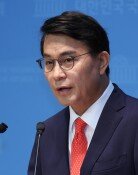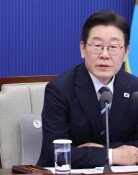[Editorial] Splendid start for the ministerial talks
[Editorial] Splendid start for the ministerial talks
Posted August. 01, 2000 14:07,
The inter-Korean ministerial talks that ended yesterday, deserve an adequate appreciation in that they took the first step to activate the June 15 South-North Joint Declaration.
Since the Declaration, the two Koreas, via the meeting of their respective Red Cross societies, reached an agreement to detail the steps for the reunion of some separated families. But the ministerial-level talks in Seoul marked the first substantial meeting toward far-reaching, concrete measures for inter-Korean cooperation and reconciliation.
This represents a great breakthrough and watershed developments in South-North relations in view of their past strained relations before the Joint Declaration. The operation of the South-North Liaison Office at Panmunjom, installed pursuant to the South-North Basic Agreements in 1992, it should be recalled, was suspended due to Pyongyang`s armed spy infiltration into the coast off Kangneung in 1996. The June 15 summit made it possible to resume the operation of the liaison office and lead to the two Koreas` ministerial-level talks.
Special significance must be attached to the agreement, in particular, for the restoration of the missing link in the Seoul-Shineuju railway. It not only symbolizes the linking of the nation`s severed main aorta, but also will make a great impact on the two Korean economies.
The agreements to hold the Aug. 15 promotional week for mutual reconciliation and to cooperate in the hometown visits by the members of Chochongnyon (pro-Pyongyang Korean residents` association in Japan) surely will be conducive to the furthering of the moments for inter-Korean reconciliation.
But we can`t hide here our frank reservations about the way North Korea has in the past observed the Aug. 15 liberation anniversary to become an occasion for the propaganda promotion for its regime. Instead of superficial gestures or propaganda rhetoric, the efforts must be made to develop realistic programs for reconciliation.
We also do not hide our regrets, as well as criticisms, about the way in which the Seoul talks superficially discussed or avoided such issues as an installment of military direct hotlines or concrete measures for easing of tensions and for building lasting structure of peace. Added to that is the fact that the talks have given no information about North Korean Defense Committee chairman Kim Jong-Il`s expected visit to Seoul, nor has the meeting made any further progress for the future reunions of separated families. As for the mutual economic collaborations, the talks failed to make any institutional devices to guarantee the safety of investments, with the exception of the issue to restore the railway link.
Needless to say, no one expects to reach satisfactory agreements on these issues at one meeting. Now the South and the North are discarding their old selves that were obsessed with mutual confrontation and conflict. They are cautiously making their first steps to orient themselves toward cooperation and reconciliation. Instead of impetuous mindsets and expectations, a composed, step-by-step approach must be our direction to take.
The most important factor to consider between the South and the North is a spirit of mutual respect and understanding. This spirit of mutual trust and confidence is imperative to ensure the effective implementation of the June 15 Joint Declaration.
This mutual trust, in our view, made it possible this time to reach the agreement to hold the second South-North ministerial talks in Pyongyang before the end of this month and to open further channels for normalized ministerial talks in future. We should add our hope that the second talks in Pyongyang will make another breakthrough in inter-Korean relations.







